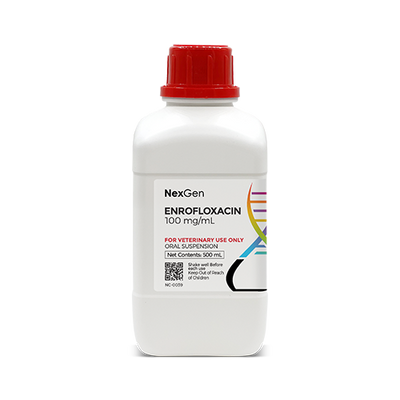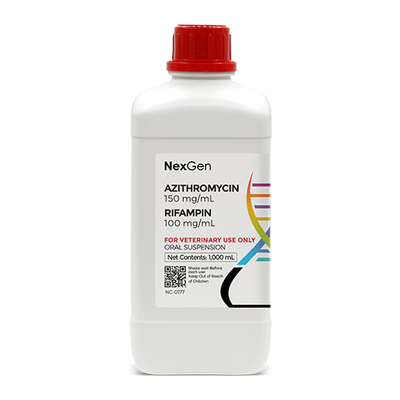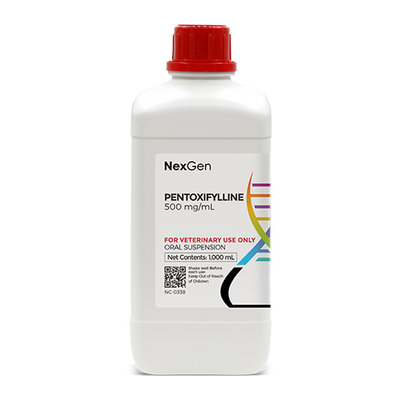
Enrofloxacin 150 mg/mL, Oral Suspension, (1000mL)
Login for pricing
- Brand
- Mixlab
- SKU:
- NC-0488
- Product Type:
- Suspension
- Size:
- 1000ml
- Administration:
- Oral
- Therapeutic Class:
- Antibacterial, Fluoroquinolone
There are nearly innumerable bacteria that exist in the average horse’s environment. While some are harmless and others are beneficial, some species (pathogens) can cause disease if given a chance. If a horse’s immune system is compromised (from stress or an existing viral or bacterial infection), or its structural defenses (e.g., skin) are breached, then bacterial infection can cause clinical disease. Additionally, there are normally benign bacteria that can become infectious if given the opportunity, such as coliform bacteria (found in manure), which can infect fresh wounds.1
The horse’s immune system is capable of taking neutralizing most bacterial infections, but the inflammatory process itself can do collateral damage to healthy tissues in the case of some infections. Other infections can quickly get out of control and produce serious consequences (e.g., septic arthritis).
Bacterial disease occurs when a horse’s immune system cannot sufficiently combat bacteria and it becomes able to replicate and spread in the horse’s body, often due to the immune system being compromised or the introduction of a high bacterial load. There are several bacterial pathogens that frequently cause disease in horses (i.e., Tetanus, Potomac Horse Fever, Salmonella, Strangles and E. Coli); others occur much more rarely.2
Equine Endometritis
Endometritis is sometimes called an “invisible” disease in equine circles because it often goes undiagnosed until it has significantly progressed. This condition affects the endometrium (lining) of a mare's uterus, causing it to become inflamed and making it an inhospitable environment for both sperm and embryos. Endometritis is a major cause of infertility in horses, affecting up to 15% of broodmares. Because it lacks clear clinical signs however, it is frequently overlooked until it has caused significant damage.
Many mares that cycle but repeatedly fail to conceive are often found to have infections in their reproductive tracts. These horses are sometimes referred to as “dirty” mares. In nearly all cases, this will be the result of endometritis.3 The reduced fertility associated with endometritis has been acknowledged for many years, and is a direct result of the unsuitable environment for the developing conceptus within the uterus.
There are several recognized classifications for equine endometritis:
-
Endometrosis (chronic degenerative endometritis)
-
Chronic infectious endometritis
-
Mating-induced endometritis (delay in uterine clearance)
-
Venereal infection3
The uterus of the mare is generally well-protected, however, contaminants can still enter the uterus during mating or artificial insemination, as well as during estrus or veterinary procedures.2 The uterine lumen of the normal fertile mare is sterile despite the fact that the reproductive tract can be contaminated with bacteria from breeding, foaling, and veterinary procedures. Mares with defective vulval conformation can suck air and bacteria into the vagina, which can lead to endometritis.3
In normal circumstances, the mare’s uterus responds to bacteria invading the reproductive tract with a rapid influx of neutrophils. Usually, these neutrophils kill the bacteria rapidly, the inflammatory byproducts are mechanically removed and the uterus returns to normal. In other cases, this inflammation is not resolved, resulting in the mare being susceptible to clinical disease.3,4
The veterinarian can confirm diagnosis of endometritis via collection of concurrent endometrial swab and smear samples during early estrus for bacteriological culture and cytological examination. The ideal technique should ensure that the swab enters the uterus and collects bacteria from only the uterine lumen. It is important to ensure that the method of swabbing does not introduce bacteria into a previously normal uterus.4
Enrofloxacin for horses
Enrofloxacin is a veterinary oral and injectable fluoroquinolone antibiotic that is effective against a variety of Gram-positive and Gram-negative pathogens, although it is not effective against anaerobes. The literature holds that its use should be avoided in young, growing animals because of the potential negative impact on cartilage development.
Enrofloxacin is typically used to treat infections requiring long-term treatment, such as osteomyelitis, sinus infections, soft tissue infections, peritonitis, and pleuritis or pneumonia. While enrofloxacin is well-absorbed orally and intravenously, it is usually not used intramuscularly because it produces irritation.
At one time, there had been reluctance among horse owners in using compounded enrofloxacin to combat endometritis, but in recent years, the success of this and other compounded medications have led to widespread acceptance among horse owners and veterinarians. The majority of research now indicates that enrofloxacin suspensions are useful in the treatment of bacterial endometritis cases.4
Where to buy Enrofloxacin Oral Suspension
Enrofloxacin oral suspension is available in the U.S. through several pharmaceutical manufacturers and through veterinary custom compounding companies.
FOR RX ONLY: A valid prescription from a licensed veterinarian is required for dispensing this medication.
2Lesté-Lasserre, C. Endometritis in Horses Explained. In: The Horse, Nov 1, 2010. https://thehorse.com/150681/endometritis-in-horses-explained/
3Pycock, J., DVM. Endometritis Classifications and Treatment. In: The Horse, Apr 1, 1999. https://thehorse.com/14445/endometritis-classifications-and-treatment/
4Beckstett, A. Compounded Enrofloxacin: Safe and Effective for Use in Mares. In The Horse, Apr 5, 2015. https://thehorse.com/111731/compounded-enrofloxacin-safe-and-effective-for-use-in-mares/




















